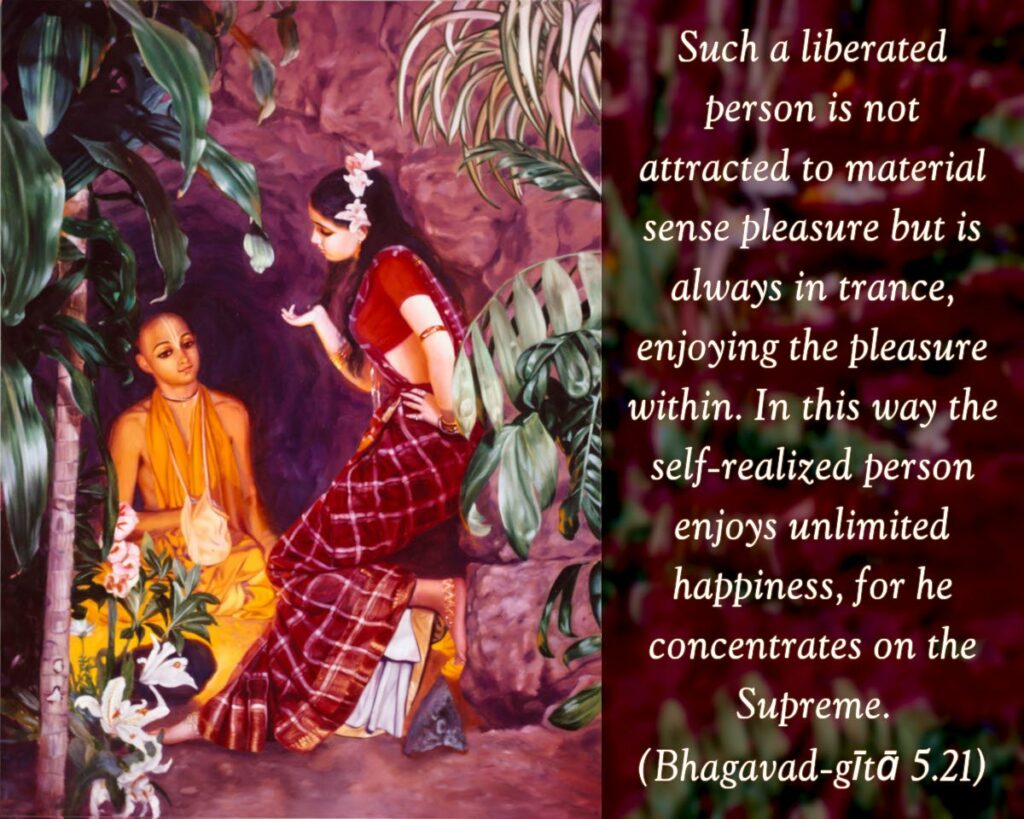बाह्यस्पर्शेष्वसक्तात्मा विन्दत्यात्मनि यत्सुखम् |
स ब्रह्मयोगयुक्तात्मा सुखमक्षयमश्नुते || 21||
bāhya-sparśheṣhvasaktātmā vindatyātmani yat sukham
sa brahma-yoga-yuktātmā sukham akṣhayam aśhnute
bāhya-sparśheṣhu—external sense pleasure; asakta-ātmā—those who are unattached; vindati—find; ātmani—in the self; yat—which; sukham—bliss; saḥ—that person; brahma-yoga yukta-ātmā—those who are united with God through yog; sukham—happiness; akṣhayam—unlimited; aśhnute—experiences
Translation:
With mind unattached to external contacts he finds happiness in Atma and with mind united with Brahman (Atma) in meditation, he enjoys imperishable happiness.
Commentary:
Eternal happiness is only in the Self and nowhere else. All other kinds of happiness arising from the contact of the senses with the external world are only short-lived and mixed with pain. They come and go. They are only the reflected joys of the Self. Real joy is only in Atma. The source of all happiness is inside and not outside. Not believing this truth, much less knowing it, the ignorant are deluded by thinking that happiness is coming to them through external objects. The dog biting the bone bruises its own mouth and licks its own blood thinking that it is coming from the bone. So is the ignorant man who runs after the elusive pleasures of life and is constantly cheated by them. Even after the repeated experience, he does not change his attitude. It has become a habitual way of thinking for the common man.
The wise man who has enquired into the nature of things develops a different attitude. He comes to know that he is himself the source of all happiness, and so he has no attachment for the pleasures derived through the senses from the objective world. Knowing this, his mind naturally turns inwards into the Self. Otherwise, the mind cannot remain steady when it is pulled out by the distractions of the sense world. So, first of all, there should be a clear understanding of the ephemeral character of sense-pleasures and the pain caused by them. Then comes dispassion (vairagya) – rejection of sense-pleasures. The less is sacrificed for the greater, the transitory is sacrificed for the eternal, and reflected joy is given up for real joy. From this verse we understand three important ideas:
- Happiness is not outside. It is inside, in Atma.
- External pleasures are short-lived and mixed with sorrow.
- Sense pleasures are obstructing the free flow of the bliss of Brahman. He who runs after them cannot experience the bliss of Brahman.
Swami Vivekananda Says —
Where is there any enjoyment but in Him? What enjoyment can there be in little clods of earth? It is the crystallised essence of infinite enjoyment that we have to seek, and that is in God. Let all our passions and emotions go up unto Him.[Source]
Bhagavad Gita: Chapter 5 🔻 (29 Verses)
